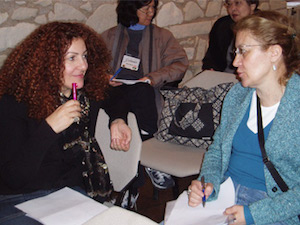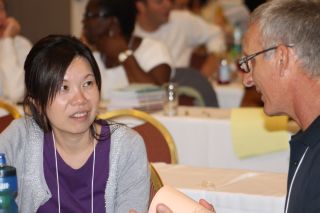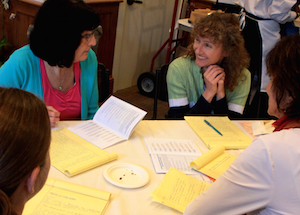
Join us for the….
Fall International Fellows Academy
on Critical Thinking
…a Socratic tutorial learning process
using first principles of critical thinking
October 10-14, 2016, in Northern CA
This academy has concluded.
See our Event Calendar for upcoming conferences and academies!
The Center and Foundation for Critical Thinking together have hosted critical thinking academies and  conferences for 35 years. During this time we have worked with more than 100,000 educators in designing instruction that places critical thinking at the core of teaching and learning.
conferences for 35 years. During this time we have worked with more than 100,000 educators in designing instruction that places critical thinking at the core of teaching and learning.
We invite you to join us for a unique learning experience led by Fellows and Visiting Scholars of the Foundation for Critical Thinking. Our Fourth International Fellows Academy on Critical Thinking will be held in Marin County, California, just north of San Francisco, on October 10-14, 2016. We will focus on placing first principles in critical thinking at the core of the curriculum, so that students come to see content as a mode of thinking to be reasoned through. Space is limited due to the intimate nature of the academy
For those seeking certification in our approach, there will be unique activities in place. Please see the section below for more information.
Students learn content within any subject only as far as they learn to think through it themselves. But they can’t just use their own thinking. They have to use skilled, disciplined, reasonable, rational thinking - in other words, critical thinking. To do this, they need consistent practice over time in taking important ideas and following out those ideas' implications, in integrating the ideas, and in questioning them when it makes sense to. They need consistent practice in applying intellectual standards to thought as they reason through problems and issues within academic disciplines. They need to start with essential intellectual standards and systemically apply them to problems and issues as they think through content. In short, they can’t just learn critical thinking in an abstract way. They need to learn the importance of applying critical thinking, both in the learning process and in real-life contexts. This academy focuses on taking the first principles of critical thinking and helping students internalize them through practice at thinking through content.
If, as educators, we are to foster deep understandings in student thought, we must first foster them in our own thinking. As an academy delegate, you will have the opportunity to work in the Paul-Elder Approach to Critical Thinking as you develop your ability to think things through using the tools of critical thinking.
 Our fellows and scholars will think along with delegates, exemplifying the disciplined thinking of master teachers that students must themselves come to internalize over time. Fellows, Visiting Scholars, and delegates will work together as students in an intellectual community, ever attempting to reason at higher and higher levels of quality as we come to deepen our understanding of the concepts and principles embedded in a rich concept of critical thinking. We will deepen our understanding of first principles in critical thinking as we apply them to content; in the process, we will develop methods for helping students learn to do the same
Our fellows and scholars will think along with delegates, exemplifying the disciplined thinking of master teachers that students must themselves come to internalize over time. Fellows, Visiting Scholars, and delegates will work together as students in an intellectual community, ever attempting to reason at higher and higher levels of quality as we come to deepen our understanding of the concepts and principles embedded in a rich concept of critical thinking. We will deepen our understanding of first principles in critical thinking as we apply them to content; in the process, we will develop methods for helping students learn to do the same
In this intensive academy, delegates will discuss essential ideas in critical thinking, learn close reading and substantive writing strategies (for their own development and for use in instruction), reason through complexities in questions within their subject fields (to help student learn to do the same), and write and receive feedback on their writing using intellectual standards (to develop their understandings while engaging as “students” thinking through content). Fellows and Scholars will participate as both “master students” and “tutors,” sometimes thinking aloud with students while exploring ideas and sometimes giving clear direction on how to better discipline one’s reasoning.
These teaching strategies reflect insights implicit in successful Oxford tutorials and Cambridge supervisions, adapted to much larger student numbers (than, for example, that of the Oxford don teaching one or two students). As part of the process, our Fellows and Scholars will model the art of critical reading, writing, and speaking in order to foster disciplined reading, writing, and speaking in student thought.
This five-day academy offers a unique opportunity to work closely with our Fellows and scholars in a small, intensive learning situation, much like the Socratic schools one might envision. This experience is for new or returning delegates to our approach. Sessions will be held during the days and evenings, as we create a seminar-style Socratic learning experience together in a disciplined intellectual community - the type of community we would hope to create on our campuses, and which would be prevalent in fairminded critical societies. This academy is designed for educators and administrators at all levels of instruction, and is concerned to foster deep and lasting internalization of critical thinking.
For Those Interested in Becoming Certified in Our Approach
This academy counts toward the requirements for certification in our approach. Those seeking certification will be trained in how to best present the foundations of critical thinking within their educational settings, and will work during the last two days of the academy to prepare for, and then practice using, our pre-designed instructional activities in fostering critical thinking among their colleagues at the academy. Most of the assessments for the certification process will be conducted during this academy, and will include written work, brief presentations (which will be videotaped and accessed), and successful performance on the International Critical Thinking Test as well as the Critical Thinking Basic Skills and Understandings Test. For information on our certification process see: Becoming Certified in Our Approach.
Academy Details and Logistics
 The fee for this Fellows Academy is $2,985. This includes the registration fee, as well as room and board at the historic Marconi Conference Center in scenic Marin County - north of San Francisco CA. Rooms are typically shared. To secure a single room, add $300 to your fee during registration. This option will expire after enough rooms have been reserved, so register early to secure a single room.
The fee for this Fellows Academy is $2,985. This includes the registration fee, as well as room and board at the historic Marconi Conference Center in scenic Marin County - north of San Francisco CA. Rooms are typically shared. To secure a single room, add $300 to your fee during registration. This option will expire after enough rooms have been reserved, so register early to secure a single room.
All meals are provided and will be taken together as we continue intellectual dialogue. (Meals will be provided beginning Sunday, October 9 at dinner, and ending Friday, October 14 after breakfast. If you have any dietary restrictions, such as food allergies, please let us know when you register.) Reasonable amounts of homework will be expected, in order to cultivate our understanding of critical thinking as much as possible during our time together. Academy delegates will need to rent a car or carpool; our academy location is 30 miles from the nearest grocery and shopping area. After you register, let us know if you would like to share a car rental with other delegates, and we will announce to delegates your request and share your emails. Linens and housecleaning provided.
For information about the venue, please visit The Marconi Center Homepage. More specific details will be provided upon registration. A small number of Fellows International Scholarships are available. For questions, or to inquire about our Fellows scholarships, email [removed].
Our Approach to Critical Thinking
Our instructional design strategies and approaches emerge from first principles in critical thinking. These include.
The Oxford Tutorial
One important set of questions the Academy poses is: What can we learn from studying the manner in which “tutorial” and “supervisory” roles are exercised in classic forms of Oxbridge tutor-student teaching and learning?
We hypothesize that there is a significant convergence between the best practices of the classic Oxford Tutorial and the "model" of teaching for critical thinking constructed, over the last 36 years, by the Foundation for Critical Thinking Fellows. This suggests a further hypothesis that the "essence" of what makes the Tutorial powerful can be usefully "exported" into larger group settings. Below are some suggested common denominators.
We posit that both traditional Oxford Tutorial and emergent Critical Thinking approaches emphasize:
Teaching with a Socratic Spirit (teaching that emphasizes the student taking ownership of content by actively thinking it through). In this mode of teaching, the inquiry process is more important than the answer, while rote memorization is accorded little importance.
Under well-designed instruction for critical thinking and well-designed Oxford Tutorials, students learn how to analyze thinking, assess thinking, and re-construct thinking - improving it thereby. The thinking studied is that which is embedded in the content of established academic disciplines. As a result, students so taught become actively engaged in thinking historically, anthropologically, sociologically, politically, chemically, biologically, mathematically, and so on.
Through these processes, students learn how to read, write, speak, and listen in a new way: critically. Most importantly they learn how to learn, using disciplined reading, writing, speaking, and listening as modalities essential to learning.
